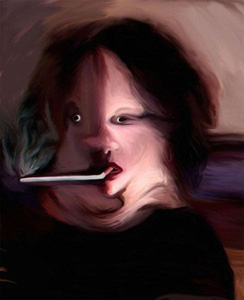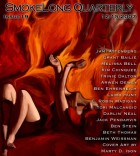“In honor of the fact” that the professor is dying, he decides to host a party. After coming to that conclusion, he dances with his wife in the kitchen. I love that. It’s a rare quality, to embrace death. Have you known anyone like this in real life?
The story was inspired by a German professor I had in the late 80s when I was doing a year abroad in Strasbourg, France on the Rhine River. At the end of the year, he had all his students out to his apartment for a party, which featured a mini-keg and sausages. I later learned that the professor had terminal cancer. He was a very sweet guy. Quiet and punctilious, but with a good sense of humor. I wish I could remember his name.
How did you decide on the format for this story?
It suddenly struck me that I could make up something interesting about my daughter learning to count and that process acting as a kind of punctuation for moments of experience in our household here, but to tell you the truth I wrote the piece a year and a half ago and can’t remember how I came up with the format. On the other hand, the piece was also a kind of response to the work of the New York based visual artist Rich O’Russa, and his work is full of spatial (if not temporal) markers. That must have played a part. I feel pretty certain about that.
The elegiac prose and the timing of details in this piece are exquisite. How long did you work at precision? Did poetry techniques come into play?
Some of my most important early reading was poetry: Susan Howe, Nathaniel Mackey, Tomas Transtromer, Robert Creeley. For quite a long time my publications were in poetry magazines — prose poetry rife with unfulfilled narrative threads. I’ve always been terribly, perhaps cripplingly interested in how I lay my words down on the page. Even now when I mostly write novels, I have a hard time letting go, even for a few lines, of my urge to score the page. Words just matter too much to me.
You are a graduate of the Jack Kerouac School of Disembodied Poetics. How does this school differ from other MFA programs?
When I went there in the 90s there was almost no emphasis at all on publication, or on the business of writing. It was all about learning to be a better reader, a deeper thinker, a writer of adventurous work. The models were all dreamers of strange dreams, builders of books that didn’t quite fit somehow or other. I don’t know if this is different from all programs, but I suspect that it is different from some.
SLQ completed issue 18 at the close of summer and launched this issue, 19, on the threshold of winter. During the three months in between, the crops were harvested, the leaves fell, the rain returned, temperatures dropped, darkness lengthened. Death in increments. How does the turning of the seasons affect your “muse,” your inspiration?
I lived on a farm in rural Indiana when I was young and after many intervening years spent in large cities I’m back in a place (Boulder, Colorado) where shifts in season are terrifically pronounced. It’s hard, when I’m working, and the weather is getting/has gotten colder, not to think about the combine running down the rows, slaughtering the corn, or about the fields lying dark and muddy all winter. That kind of thing gets stuck in your mind and won’t shake loose. Not that I want it to.



 The core workshop of SmokeLong Fitness is all in writing, so you can take part from anywhere at anytime. We are excited about creating a supportive, consistent and structured environment for flash writers to work on their craft in a community. We are thrilled and proud to say that our workshop participants have won, placed, or been listed in every major flash competition. Community works.
The core workshop of SmokeLong Fitness is all in writing, so you can take part from anywhere at anytime. We are excited about creating a supportive, consistent and structured environment for flash writers to work on their craft in a community. We are thrilled and proud to say that our workshop participants have won, placed, or been listed in every major flash competition. Community works.